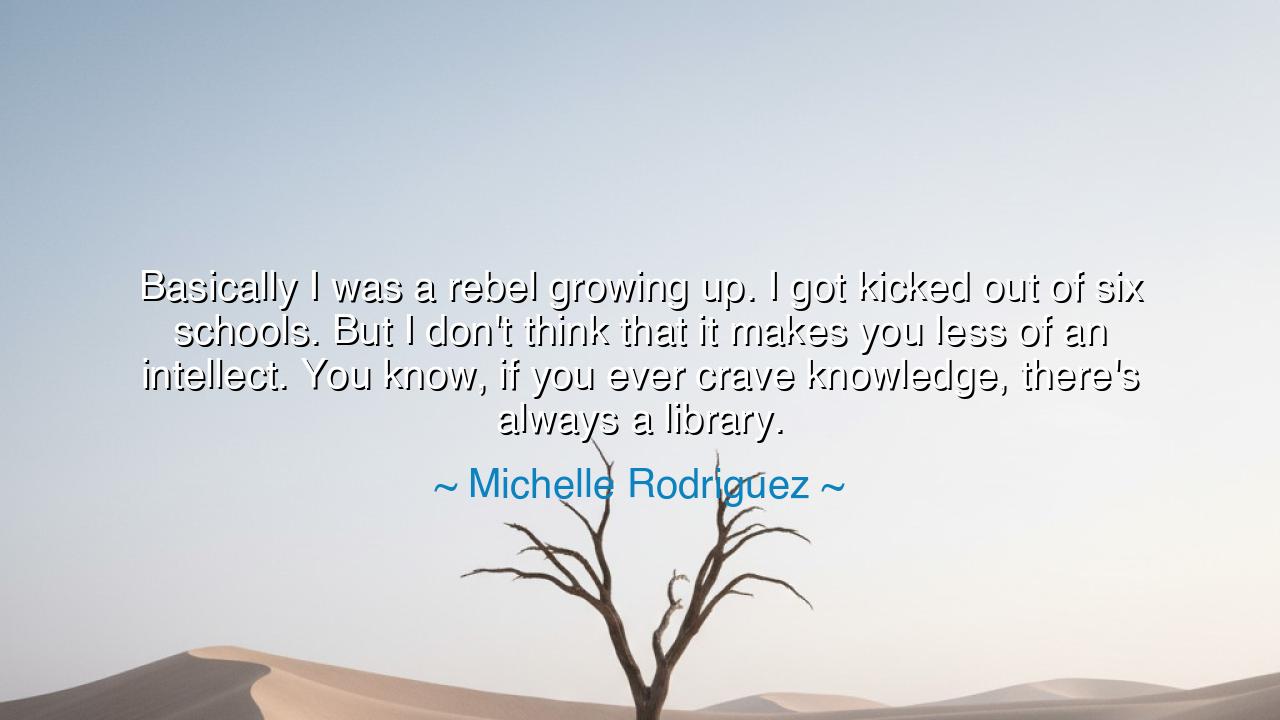
Basically I was a rebel growing up. I got kicked out of six
Basically I was a rebel growing up. I got kicked out of six schools. But I don't think that it makes you less of an intellect. You know, if you ever crave knowledge, there's always a library.






The actress Michelle Rodriguez, known for her fiery spirit and unyielding strength, once said: “Basically I was a rebel growing up. I got kicked out of six schools. But I don’t think that it makes you less of an intellect. You know, if you ever crave knowledge, there’s always a library.” Beneath these defiant words lies not merely the confession of a rebellious youth, but the declaration of a timeless truth—that wisdom and intellect do not belong solely to the obedient, the well-schooled, or the conventional. They belong to the seeker, the dreamer, the one who hungers for truth. Rodriguez’s words are the anthem of the self-taught soul, the rebel whose curiosity cannot be confined by walls or rules.
In her life and in her art, Rodriguez has embodied the restless spirit of independence. She was not molded by institutions but by experience—by hardship, persistence, and her own unrelenting desire to understand the world. When she says she was expelled from six schools, she speaks not in shame but in triumph, for she discovered that the craving for knowledge is more powerful than the approval of authority. A school can expel a student from its halls, but no one can expel a mind from the realm of learning. The library, that sanctuary of silent wisdom, stands open to all who seek it. There, without judgment or hierarchy, the rebel and the scholar drink from the same well.
This truth is ancient. The greatest minds of history were often those who walked outside the boundaries of convention. Socrates, accused of corrupting the youth, was condemned for asking questions that his society feared to answer. Leonardo da Vinci, unschooled in formal education, taught himself the secrets of anatomy, mathematics, and the stars. Frederick Douglass, born into slavery and forbidden to learn, risked his life to read—and through that knowledge, he freed not only himself but countless others. Each of these spirits would have understood Rodriguez’s words: that rebellion against conformity can be the beginning of true wisdom, and that the thirst for learning is a fire no institution can extinguish.
In her quote, the library becomes a symbol of hope and freedom. It is not merely a building of books—it is the temple of possibility. Within it lies the gathered memory of all humankind, waiting patiently for those bold enough to seek it. For the one who “craves knowledge,” as Rodriguez says, there are no barriers—only doors to be opened. The rebel who enters the library is no longer at war with the world; she becomes an ally of every thinker, poet, and philosopher who ever lived. This is the paradox of the rebel’s journey: what begins in defiance often ends in discovery.
Rodriguez’s words also challenge the false belief that intellect is measured by compliance or credential. True intelligence is not obedience—it is inquiry. It is the courage to question, the humility to learn, and the will to seek understanding beyond the boundaries of expectation. The rebel’s mind may wander, may stumble, may clash with authority, but it burns with life. And it is life, not conformity, that gives rise to genius. Many of the world’s innovators—Edison, Jobs, Einstein—were restless spirits who learned as much from failure and curiosity as from any formal schooling. They, too, might have nodded in agreement with Rodriguez: if you crave knowledge, you will find it.
Yet, O listener, her words carry more than defiance—they carry responsibility. To crave knowledge is not enough; one must pursue it with discipline. The library may open its doors, but only those who enter with patience will uncover its treasures. Rebellion, without direction, leads only to noise; but rebellion joined with purpose becomes revolution. So, let your independence be guided by hunger for truth, not by pride. Read widely. Listen deeply. Seek the wisdom of those who came before, not as a chain to bind you, but as a torch to guide your own path.
Thus, the lesson of Michelle Rodriguez’s words is both bold and tender: your past does not define your mind; your curiosity does. Whether cast out or accepted, praised or condemned, the one who loves knowledge will always find a way to learn. The school may reject you; the world may misunderstand you—but the library of life stands open, filled with light for those who seek it. Do not wait for permission to grow wiser. Take up the book. Ask the question. Begin the search.
For in the end, the rebel who craves knowledge becomes something greater than a rebel—she becomes a builder of her own destiny. And when others ask where she learned such strength, she will answer, as Michelle Rodriguez did, with quiet triumph: “There’s always a library.”






AAdministratorAdministrator
Welcome, honored guests. Please leave a comment, we will respond soon